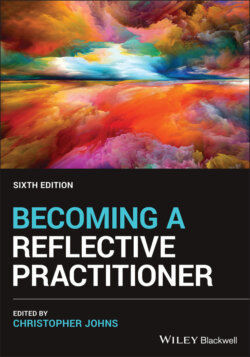Читать книгу Becoming a Reflective Practitioner - Группа авторов - Страница 19
Boyd and Fales (1983)
ОглавлениеThese authors write: ‘We define reflection as the process of creating and clarifying the meaning of experience (present or past) in terms of self (self in relation to self and self in relation to the world). The outcome of the process is changed conceptual perspective. The experience that is explored and examined to create meaning focuses around or embodies a concern of central importance to the self’. (p. 101)
From their research with counsellors, they extrapolate reflection through six components (p. 106):
1 A sense of inner discomfort.
2 Identification or clarification of the concern.
3 Openness to new information from internal and external sources, with ability to observe and take in from a variety of perspectives, and a setting aside of an immediate need for closure.
4 Resolution, expressed as ‘integration’, ‘coming together’, ‘acceptance of reality’, and ‘creative synthesis’.
5 Establishing a continuity of self with past, present, and future.
6 Deciding whether to act on the outcome of the reflective process.
In relation to stage 6, they note ‘the new insight or changed perspective is analyzed in terms of its operational feasibility involving the practitioner’s sense of rightness, values and potential acceptance by others’. (p. 112).
I generally agree that reflection is triggered by ‘inner discomfort’ for practitioners when first engaging reflection. However, as the practitioner becomes more mindful, then all experience, not just ‘inner discomfort’ becomes available for reflection. I equate the idea of changed conceptual perspective with insight (see Chapters 4 and 5).
